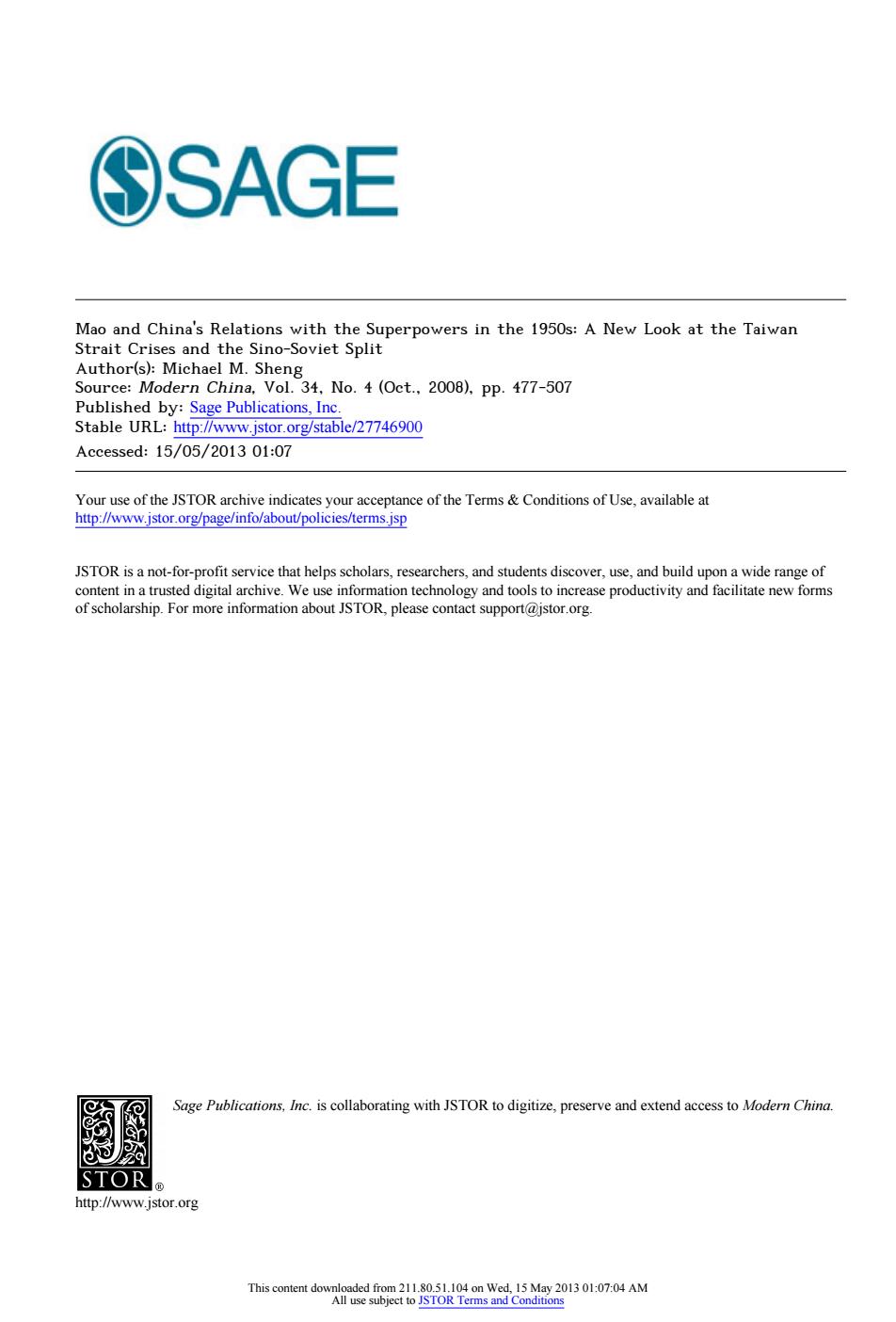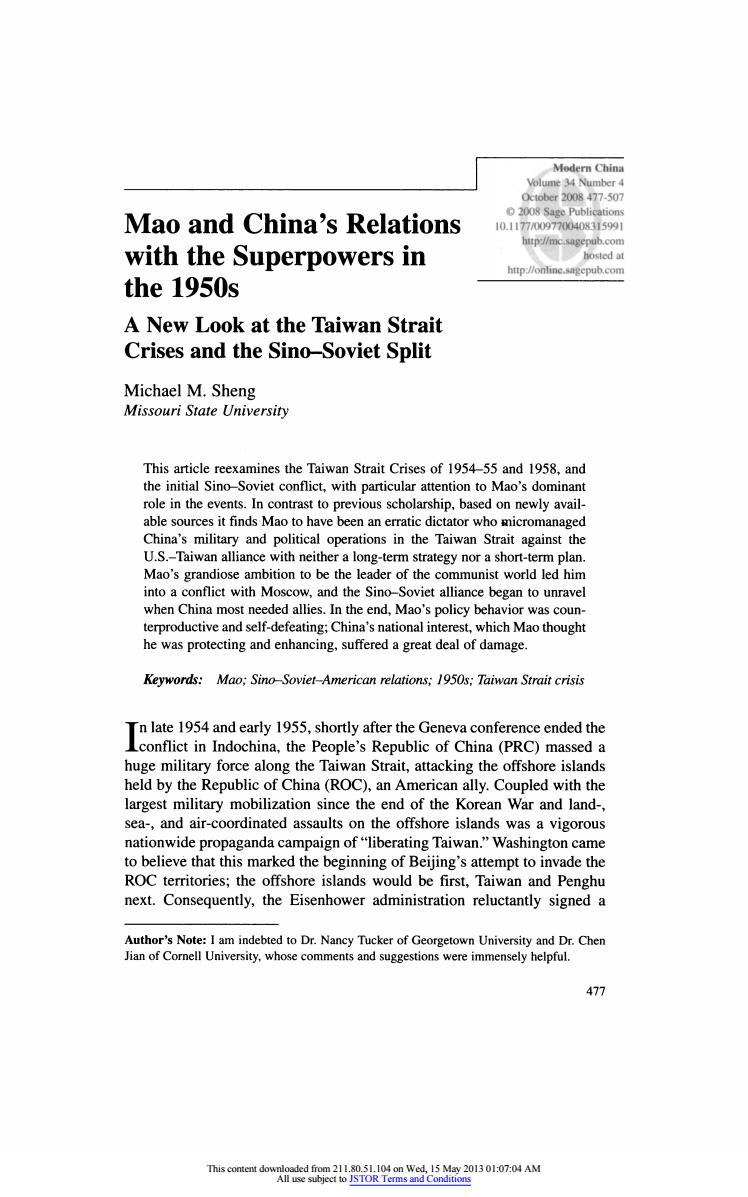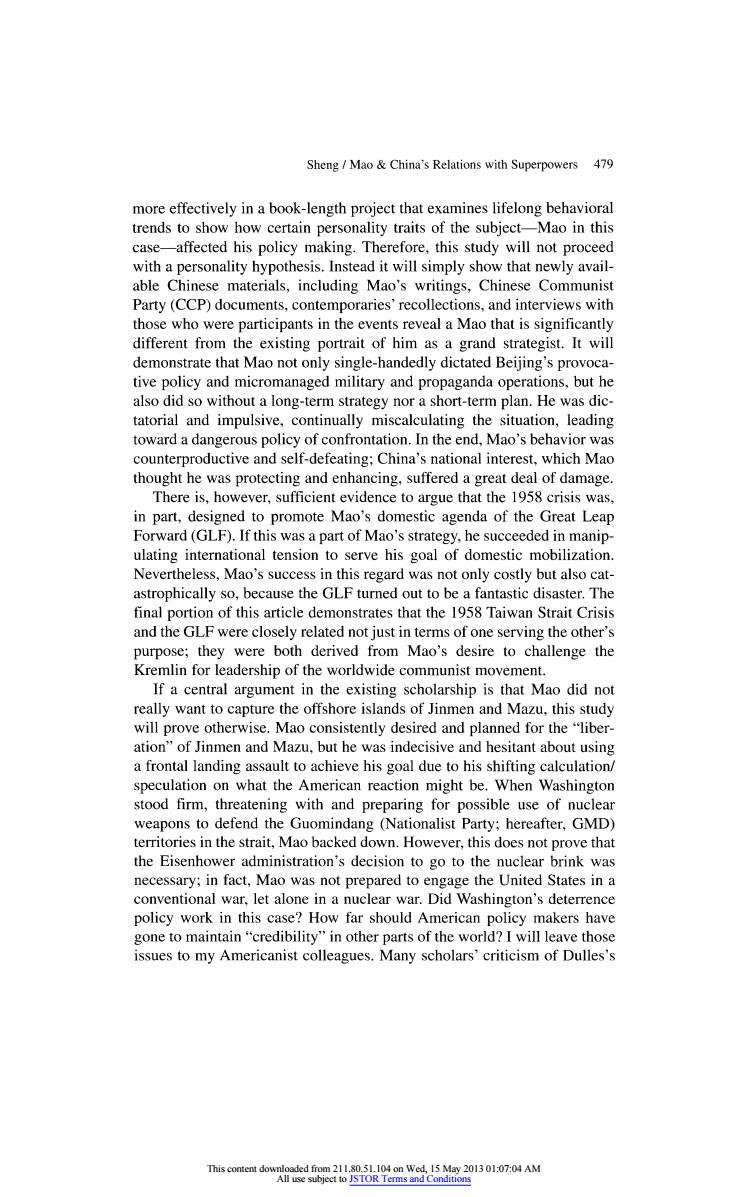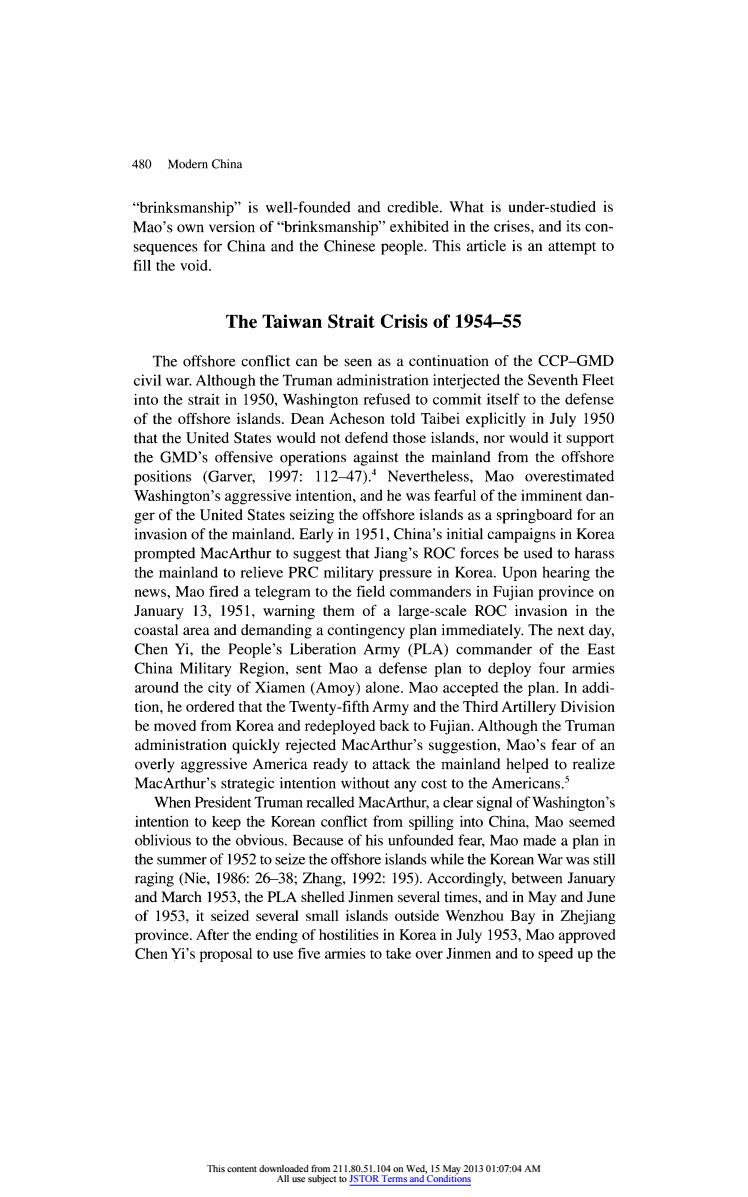
SAGE Mao and China's Relations with the Superpowers in the 1950s:A New Look at the Taiwan Strait Crises and the Sino-Soviet Split Author(s):Michael M.Sheng Source:Modern China,Vol.34,No.4 (Oct.,2008),pp.477-507 Published by:Sage Publications,Inc. Stable URL:http://www.jstor.org/stable/27746900 Accessed:15/05/201301:07 Your use of the JSTOR archive indicates your acceptance of the Terms Conditions of Use,available at http://www.jstor.org/page/info/about/policies/terms.jsp JSTOR is a not-for-profit service that helps scholars,researchers,and students discover,use,and build upon a wide range of content in a trusted digital archive.We use information technology and tools to increase productivity and facilitate new forms of scholarship.For more information about JSTOR,please contact support@jstor.org. Sage Publications,Inc.is collaborating with JSTOR to digitize,preserve and extend access to Modern China. 29 STOR http://www.jstor.org This content downloaded from 211.80.51.104 on Wed,15 May 2013 01:07:04 AM All use subject to JSTOR Terms and Conditions
Mao and China's Relations with the Superpowers in the 1950s: A New Look at the Taiwan Strait Crises and the Sino-Soviet Split Author(s): Michael M. Sheng Source: Modern China, Vol. 34, No. 4 (Oct., 2008), pp. 477-507 Published by: Sage Publications, Inc. Stable URL: http://www.jstor.org/stable/27746900 . Accessed: 15/05/2013 01:07 Your use of the JSTOR archive indicates your acceptance of the Terms & Conditions of Use, available at . http://www.jstor.org/page/info/about/policies/terms.jsp . JSTOR is a not-for-profit service that helps scholars, researchers, and students discover, use, and build upon a wide range of content in a trusted digital archive. We use information technology and tools to increase productivity and facilitate new forms of scholarship. For more information about JSTOR, please contact support@jstor.org. . Sage Publications, Inc. is collaborating with JSTOR to digitize, preserve and extend access to Modern China. http://www.jstor.org This content downloaded from 211.80.51.104 on Wed, 15 May 2013 01:07:04 AM All use subject to JSTOR Terms and Conditions

Modern China Volume 34 Number 4 0 ctober2008477-507 2008 Sage Publications Mao and China's Relations 10.11770097700408315991 http://mc.sagepub.com with the Superpowers in hosted at http://online.sagepub.com the 1950s A New Look at the Taiwan Strait Crises and the Sino-Soviet Split Michael M.Sheng Missouri State University This article reexamines the Taiwan Strait Crises of 1954-55 and 1958,and the initial Sino-Soviet conflict,with particular attention to Mao's dominant role in the events.In contrast to previous scholarship,based on newly avail- able sources it finds Mao to have been an erratic dictator who micromanaged China's military and political operations in the Taiwan Strait against the U.S.-Taiwan alliance with neither a long-term strategy nor a short-term plan. Mao's grandiose ambition to be the leader of the communist world led him into a conflict with Moscow,and the Sino-Soviet alliance began to unravel when China most needed allies.In the end,Mao's policy behavior was coun- terproductive and self-defeating:China's national interest,which Mao thought he was protecting and enhancing,suffered a great deal of damage. Keywords:Mao;Sino-Soviet-American relations;1950s;Taiwan Strait crisis Tn late 1954 and early 1955,shortly after the Geneva conference ended the Lconflict in Indochina,the People's Republic of China(PRC)massed a huge military force along the Taiwan Strait,attacking the offshore islands held by the Republic of China(ROC),an American ally.Coupled with the largest military mobilization since the end of the Korean War and land-, sea-,and air-coordinated assaults on the offshore islands was a vigorous nationwide propaganda campaign of"liberating Taiwan."Washington came to believe that this marked the beginning of Beijing's attempt to invade the ROC territories;the offshore islands would be first,Taiwan and Penghu next.Consequently,the Eisenhower administration reluctantly signed a Author's Note:I am indebted to Dr.Nancy Tucker of Georgetown University and Dr.Chen Jian of Cornell University,whose comments and suggestions were immensely helpful. 477 This content downloaded from 211.80.51.104 on Wed,15 May 2013 01:07:04 AM All use subject to JSTOR Terms and Conditions
Mao and China's Relations with the Superpowers in the 1950s A New Look at the Taiwan Strait Crises and the Sino-Soviet Split Michael M. Sheng Missouri State University This article reexamines the Taiwan Strait Crises of 1954-55 and 1958, and the initial Sino-Soviet conflict, with particular attention to Mao's dominant role in the events. In contrast to previous scholarship, based on newly avail able sources it finds Mao to have been an erratic dictator who micromanaged China's military and political operations in the Taiwan Strait against the U.S.-Taiwan alliance with neither a long-term strategy nor a short-term plan. Mao's grandiose ambition to be the leader of the communist world led him into a conflict with Moscow, and the Sino-Soviet alliance began to unravel when China most needed allies. In the end, Mao's policy behavior was coun terproductive and self-defeating; China's national interest, which Mao thought he was protecting and enhancing, suffered a great deal of damage. Keywords: Mao; Sino-Soviet-American relations; 1950s; Taiwan Strait crisis In late 1954 and early 1955, shortly after the Geneva conference ended the conflict in Indochina, the People's Republic of China (PRC) massed a huge military force along the Taiwan Strait, attacking the offshore islands held by the Republic of China (ROC), an American ally. Coupled with the largest military mobilization since the end of the Korean War and land-, sea-, and air-coordinated assaults on the offshore islands was a vigorous nationwide propaganda campaign of "liberating Taiwan." Washington came to believe that this marked the beginning of Beijing's attempt to invade the ROC territories; the offshore islands would be first, Taiwan and Penghu next. Consequently, the Eisenhower administration reluctantly signed a Author's Note: I am indebted to Dr. Nancy Tucker of Georgetown University and Dr. Chen Jian of Cornell University, whose comments and suggestions were immensely helpful. 477 This content downloaded from 211.80.51.104 on Wed, 15 May 2013 01:07:04 AM All use subject to JSTOR Terms and Conditions

478 Modern China mutual defense treaty with Jiang Jieshi's government,hoping that would deter Beijing's aggression.The PRC under the leadership of Mao Zedong, however,was not deterred,and the crisis deepened while the People's Liberation Army's pressure on the offshore islands continued.In response, the United States assembled a huge air-naval force in the region.The Eisenhower administration,with the support of Congress,started to prepare the American people for the possible use of tactical atomic bombs.A nuclear war was on the brink.Facing a determined opponent and the for- midable U.S.military presence,Mao agreed to resolve the conflict through negotiations;Sino-American ambassadorial talks ensued shortly afterward. The first Taiwan Strait Crisis simmered down only to flare up all over again in 1958,leading toward another brink of nuclear war.At the same time,the Beijing-Moscow alliance started to unravel. What was Beijing's strategic objective in provoking the two crises? What were the consequences of Mao's policy for China?Some scholars emphasize the nationalistic nature of Beijing's policy,the main goal of which was to frustrate the alleged U.S.intention to detach Taiwan from China (Stolper,1985:3-11).'Others note the miscalculation and misper- ception on both sides,but they emphasize the supposed overreaction on the part of the Eisenhower-Dulles team,arguing that Beijing never really intended to capture Jinmen (Quemoy)and Mazu (Matsu)(Chang and He, 1993).2 Still other scholars stress domestic mobilization:Mao's chief inten- tion,according to this view,was to exploit international tension in order to promote his political agenda at home-thus implying that by going to the brink,Washington overreacted (Christensen,1996;Chen,2001:163-204). In all scholarly works in the field,Mao has been portrayed as a strong, nationalistic leader.With a grand style and strategy,he was rational and calculating-rightly or wrongly-when it came to protecting China against powerful adversaries.Curiously,although it is a commonly accepted among scholars that in both cases Mao was central in the policy process,no study has focused on Mao's policy behavior:what made Mao tick?The existing theories of rational actor,ideological influence,misperception,and the like reveal certain aspects of Mao's decision-making process.However, the assumption that any world leader,including Mao,is always rational is dangerously erroneous.Personality matters in policy making,particularly in a dictatorship such as Mao's China where the policy process is in the hands of one man (Greenstein,2000).3 The difficult part of the personality approach is,first of all,to depict and analyze the subject's personality traits and formation-which need psychological insights-and then to link cer- tain personality attributes to the particular historical event.This can be done This content downloaded from 211.80.51.104 on Wed,15 May 2013 01:07:04 AM All use subject to JSTOR Terms and Conditions
478 Modern China mutual defense treaty with Jiang Jieshi's government, hoping that would deter Beijing's aggression. The PRC under the leadership of Mao Zedong, however, was not deterred, and the crisis deepened while the People's Liberation Army's pressure on the offshore islands continued. In response, the United States assembled a huge air-naval force in the region. The Eisenhower administration, with the support of Congress, started to prepare the American people for the possible use of tactical atomic bombs. A nuclear war was on the brink. Facing a determined opponent and the for midable U.S. military presence, Mao agreed to resolve the conflict through negotiations; Sino-American ambassadorial talks ensued shortly afterward. The first Taiwan Strait Crisis simmered down only to flare up all over again in 1958, leading toward another brink of nuclear war. At the same time, the Beijing-Moscow alliance started to unravel. What was Beijing's strategic objective in provoking the two crises? What were the consequences of Mao's policy for China? Some scholars emphasize the nationalistic nature of Beijing's policy, the main goal of which was to frustrate the alleged U.S. intention to detach Taiwan from China (Stolper, 1985: 3?11).1 Others note the miscalculation and misper ception on both sides, but they emphasize the supposed overreaction on the part of the Eisenhower-Dulles team, arguing that Beijing never really intended to capture Jinmen (Quemoy) and Mazu (Matsu) (Chang and He, 1993).2 Still other scholars stress domestic mobilization: Mao's chief inten tion, according to this view, was to exploit international tension in order to promote his political agenda at home?thus implying that by going to the brink, Washington overreacted (Christensen, 1996; Chen, 2001: 163-204). In all scholarly works in the field, Mao has been portrayed as a strong, nationalistic leader. With a grand style and strategy, he was rational and calculating?rightly or wrongly?when it came to protecting China against powerful adversaries. Curiously, although it is a commonly accepted among scholars that in both cases Mao was central in the policy process, no study has focused on Mao's policy behavior: what made Mao tick? The existing theories of rational actor, ideological influence, misperception, and the like reveal certain aspects of Mao's decision-making process. However, the assumption that any world leader, including Mao, is always rational is dangerously erroneous. Personality matters in policy making, particularly in a dictatorship such as Mao's China where the policy process is in the hands of one man (Greenstein, 2000).3 The difficult part of the personality approach is, first of all, to depict and analyze the subject's personality traits and formation?which need psychological insights?and then to link cer tain personality attributes to the particular historical event. This can be done This content downloaded from 211.80.51.104 on Wed, 15 May 2013 01:07:04 AM All use subject to JSTOR Terms and Conditions

Sheng/Mao China's Relations with Superpowers 479 more effectively in a book-length project that examines lifelong behavioral trends to show how certain personality traits of the subject-Mao in this case-affected his policy making.Therefore,this study will not proceed with a personality hypothesis.Instead it will simply show that newly avail- able Chinese materials,including Mao's writings,Chinese Communist Party(CCP)documents,contemporaries'recollections,and interviews with those who were participants in the events reveal a Mao that is significantly different from the existing portrait of him as a grand strategist.It will demonstrate that Mao not only single-handedly dictated Beijing's provoca- tive policy and micromanaged military and propaganda operations,but he also did so without a long-term strategy nor a short-term plan.He was dic- tatorial and impulsive,continually miscalculating the situation,leading toward a dangerous policy of confrontation.In the end,Mao's behavior was counterproductive and self-defeating;China's national interest,which Mao thought he was protecting and enhancing,suffered a great deal of damage. There is,however,sufficient evidence to argue that the 1958 crisis was, in part,designed to promote Mao's domestic agenda of the Great Leap Forward(GLF).If this was a part of Mao's strategy,he succeeded in manip- ulating international tension to serve his goal of domestic mobilization. Nevertheless,Mao's success in this regard was not only costly but also cat- astrophically so,because the GLF turned out to be a fantastic disaster.The final portion of this article demonstrates that the 1958 Taiwan Strait Crisis and the GLF were closely related not just in terms of one serving the other's purpose;they were both derived from Mao's desire to challenge the Kremlin for leadership of the worldwide communist movement. If a central argument in the existing scholarship is that Mao did not really want to capture the offshore islands of Jinmen and Mazu.this study will prove otherwise.Mao consistently desired and planned for the "liber- ation"of Jinmen and Mazu,but he was indecisive and hesitant about using a frontal landing assault to achieve his goal due to his shifting calculation/ speculation on what the American reaction might be.When Washington stood firm,threatening with and preparing for possible use of nuclear weapons to defend the Guomindang (Nationalist Party:hereafter.GMD) territories in the strait,Mao backed down.However,this does not prove that the Eisenhower administration's decision to go to the nuclear brink was necessary;in fact,Mao was not prepared to engage the United States in a conventional war,let alone in a nuclear war.Did Washington's deterrence policy work in this case?How far should American policy makers have gone to maintain"credibility"in other parts of the world?I will leave those issues to my Americanist colleagues.Many scholars'criticism of Dulles's This content downloaded from 211.80.51.104 on Wed,15 May 2013 01:07:04 AM All use subject to JSTOR Terms and Conditions
Sheng / Mao & China's Relations with Superpowers 479 more effectively in a book-length project that examines lifelong behavioral trends to show how certain personality traits of the subject?Mao in this case?affected his policy making. Therefore, this study will not proceed with a personality hypothesis. Instead it will simply show that newly avail able Chinese materials, including Mao's writings, Chinese Communist Party (CCP) documents, contemporaries' recollections, and interviews with those who were participants in the events reveal a Mao that is significantly different from the existing portrait of him as a grand strategist. It will demonstrate that Mao not only single-handedly dictated Beijing's provoca tive policy and micromanaged military and propaganda operations, but he also did so without a long-term strategy nor a short-term plan. He was dic tatorial and impulsive, continually miscalculating the situation, leading toward a dangerous policy of confrontation. In the end, Mao's behavior was counterproductive and self-defeating; China's national interest, which Mao thought he was protecting and enhancing, suffered a great deal of damage. There is, however, sufficient evidence to argue that the 1958 crisis was, in part, designed to promote Mao's domestic agenda of the Great Leap Forward (GLF). If this was a part of Mao's strategy, he succeeded in manip ulating international tension to serve his goal of domestic mobilization. Nevertheless, Mao's success in this regard was not only costly but also cat astrophically so, because the GLF turned out to be a fantastic disaster. The final portion of this article demonstrates that the 1958 Taiwan Strait Crisis and the GLF were closely related not just in terms of one serving the other's purpose; they were both derived from Mao's desire to challenge the Kremlin for leadership of the worldwide communist movement. If a central argument in the existing scholarship is that Mao did not really want to capture the offshore islands of Jinmen and Mazu, this study will prove otherwise. Mao consistently desired and planned for the "liber ation" of Jinmen and Mazu, but he was indecisive and hesitant about using a frontal landing assault to achieve his goal due to his shifting calculation/ speculation on what the American reaction might be. When Washington stood firm, threatening with and preparing for possible use of nuclear weapons to defend the Guomindang (Nationalist Party; hereafter, GMD) territories in the strait, Mao backed down. However, this does not prove that the Eisenhower administration's decision to go to the nuclear brink was necessary; in fact, Mao was not prepared to engage the United States in a conventional war, let alone in a nuclear war. Did Washington's deterrence policy work in this case? How far should American policy makers have gone to maintain "credibility" in other parts of the world? I will leave those issues to my Americanist colleagues. Many scholars' criticism of Dulles's This content downloaded from 211.80.51.104 on Wed, 15 May 2013 01:07:04 AM All use subject to JSTOR Terms and Conditions

480 Modern China "brinksmanship"is well-founded and credible.What is under-studied is Mao's own version of"brinksmanship"exhibited in the crises,and its con- sequences for China and the Chinese people.This article is an attempt to fill the void. The Taiwan Strait Crisis of 1954-55 The offshore conflict can be seen as a continuation of the CCP-GMD civil war.Although the Truman administration interjected the Seventh Fleet into the strait in 1950,Washington refused to commit itself to the defense of the offshore islands.Dean Acheson told Taibei explicitly in July 1950 that the United States would not defend those islands,nor would it support the GMD's offensive operations against the mainland from the offshore positions (Garver,1997:112-47).Nevertheless,Mao overestimated Washington's aggressive intention,and he was fearful of the imminent dan- ger of the United States seizing the offshore islands as a springboard for an invasion of the mainland.Early in 1951,China's initial campaigns in Korea prompted MacArthur to suggest that Jiang's ROC forces be used to harass the mainland to relieve PRC military pressure in Korea.Upon hearing the news,Mao fired a telegram to the field commanders in Fujian province on January 13,1951,warning them of a large-scale ROC invasion in the coastal area and demanding a contingency plan immediately.The next day, Chen Yi,the People's Liberation Army (PLA)commander of the East China Military Region,sent Mao a defense plan to deploy four armies around the city of Xiamen(Amoy)alone.Mao accepted the plan.In addi- tion,he ordered that the Twenty-fifth Army and the Third Artillery Division be moved from Korea and redeployed back to Fujian.Although the Truman administration quickly rejected MacArthur's suggestion,Mao's fear of an overly aggressive America ready to attack the mainland helped to realize MacArthur's strategic intention without any cost to the Americans.5 When President Truman recalled MacArthur,a clear signal of Washington's intention to keep the Korean conflict from spilling into China.Mao seemed oblivious to the obvious.Because of his unfounded fear,Mao made a plan in the summer of 1952 to seize the offshore islands while the Korean War was still raging (Nie,1986:26-38;Zhang,1992:195).Accordingly,between January and March 1953,the PLA shelled Jinmen several times,and in May and June of 1953,it seized several small islands outside Wenzhou Bay in Zhejiang province.After the ending of hostilities in Korea in July 1953,Mao approved Chen Yi's proposal to use five armies to take over Jinmen and to speed up the This content downloaded from 211.80.51.104 on Wed,15 May 2013 01:07:04 AM All use subject to JSTOR Terms and Conditions
480 Modern China "brinksmanship" is well-founded and credible. What is under-studied is Mao's own version of "brinksmanship" exhibited in the crises, and its con sequences for China and the Chinese people. This article is an attempt to fill the void. The Taiwan Strait Crisis of 1954-55 The offshore conflict can be seen as a continuation of the CCP-GMD civil war. Although the Truman administration interjected the Seventh Fleet into the strait in 1950, Washington refused to commit itself to the defense of the offshore islands. Dean Acheson told Taibei explicitly in July 1950 that the United States would not defend those islands, nor would it support the GMD's offensive operations against the mainland from the offshore positions (Garver, 1997: 112-41).4 Nevertheless, Mao overestimated Washington's aggressive intention, and he was fearful of the imminent dan ger of the United States seizing the offshore islands as a springboard for an invasion of the mainland. Early in 1951, China's initial campaigns in Korea prompted Mac Arthur to suggest that Jiang's ROC forces be used to harass the mainland to relieve PRC military pressure in Korea. Upon hearing the news, Mao fired a telegram to the field commanders in Fujian province on January 13, 1951, warning them of a large-scale ROC invasion in the coastal area and demanding a contingency plan immediately. The next day, Chen Yi, the People's Liberation Army (PLA) commander of the East China Military Region, sent Mao a defense plan to deploy four armies around the city of Xiamen (Amoy) alone. Mao accepted the plan. In addi tion, he ordered that the Twenty-fifth Army and the Third Artillery Division be moved from Korea and redeployed back to Fujian. Although the Truman administration quickly rejected MacArthur's suggestion, Mao's fear of an overly aggressive America ready to attack the mainland helped to realize MacArthur's strategic intention without any cost to the Americans.5 When President Truman recalled Mac Arthur, a clear signal of Washington's intention to keep the Korean conflict from spilling into China, Mao seemed oblivious to the obvious. Because of his unfounded fear, Mao made a plan in the summer of 1952 to seize the offshore islands while the Korean War was still raging (Nie, 1986: 26-38; Zhang, 1992: 195). Accordingly, between January and March 1953, the PL A shelled Jinmen several times, and in May and June of 1953, it seized several small islands outside Wenzhou Bay in Zhejiang province. After the ending of hostilities in Korea in July 1953, Mao approved Chen Yi's proposal to use five armies to take over Jinmen and to speed up the This content downloaded from 211.80.51.104 on Wed, 15 May 2013 01:07:04 AM All use subject to JSTOR Terms and Conditions